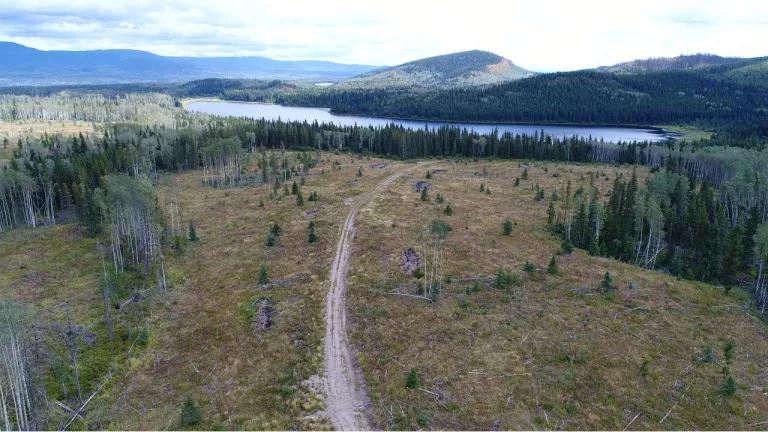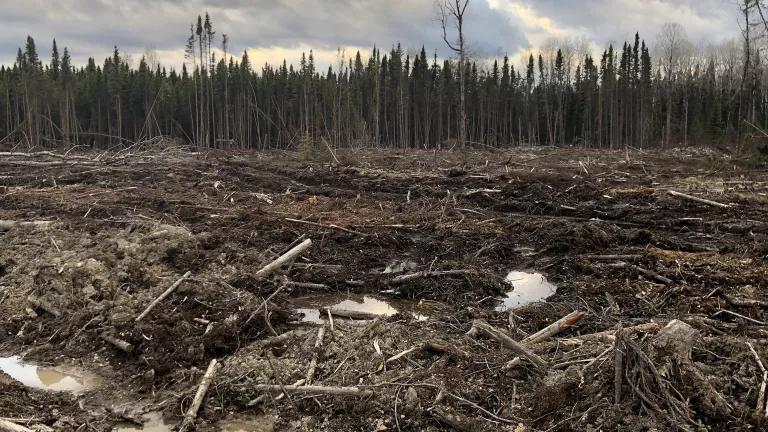Kimberly-Clark Is on a Roll with New Forest Policy and Goals
The maker of Kleenex, Cottonelle, and Scott tissue products just committed to go beyond its biggest competitors.

An image of the boreal forest in Ontario.
River Jordan for NRDC
The Kimberly-Clark Corporation just committed to go beyond its biggest competitors when it comes to more sustainable forest sourcing. The company, which makes Kleenex, Cottonelle, and Scott tissue products, published its new Forests, Land, and Agriculture Policy, which demonstrates the company’s commitment to reducing forest degradation in all its products, and is paired with an announcement that they aim to rid their entire product line of natural forest fiber.
These actions represent a huge step forward for the toilet paper manufacturer and for addressing longstanding loopholes in global supply chains that harm northern forests, and which will hopefully create a ripple effect for more responsible sourcing across the market.
Going “Natural Forest Fiber Free”
Kimberly-Clark’s policy and recent actions have many strengths. Broadly, the company’s ambition to go “Natural Forest Fiber Free” sets a higher bar for the biggest players in the family care sector. The biggest toilet paper manufacturers in the United States make their consumer-facing tissue products almost entirely from tree fiber, including from climate-critical forests like the boreal forest of Canada. This fuels a wasteful tree-to-toilet pipeline that harms the climate and biodiversity. Kimberly-Clark’s new goal signals that all the products Kimberly-Clark manufactures will eventually no longer be made using natural forest fiber, which, according to the definition in its new policy, includes old growth, primary, and some managed forests that closely resemble naturally regenerating forests in structure and complexity.
Kimberly-Clark’s reliance on natural forest fiber and failure to make its recycled content tissue products widely available for purchase are top reasons why its tissue brands have consistently scored so low in NRDC’s Issue with Tissue sustainability scorecard. While the company does have products that use non-natural forest fiber, including recycled content, these are in its business lines, which are products that the company sells directly to businesses and are not typically available on retail shelves for consumer purchase. The new goal is unclear about how quickly Kimberly-Clark will achieve the elimination of natural forest fiber, however. While the company has specified that it will be more than halfway to that goal by 2030, it has not set a date for being fully natural forest fiber free.
Positive momentum in Kimberly-Clark’s policy
The company has now committed to reduce the impact of forest degradation in its supply chain. Industrial logging, as the single largest driver of tree cover loss in the world, is a major driver of forest degradation, yet it receives little scrutiny in global policy or the marketplace.
Kimberly-Clark’s policy is significant precisely because of where and how it currently gets its fiber. Much of the pulp the company (along with competitors like Procter & Gamble, maker of Charmin) gets comes from northern forests like the boreal forest of Canada, where industrial logging is a major threat to forests’ ecological integrity. Much of this logging occurs in primary, old-growth, and mature forests, with irreversible climate and biodiversity impacts. Northern forests are among the world’s most carbon-rich ecosystems, and the climate impacts of logging in countries like Canada rival those of other high-emitting sectors. By setting a policy with the intent to reduce degradation, Kimberly-Clark makes clear that it sees degradation, including in northern forests, as a risk and has decided to act on it.
Furthermore, Kimberly-Clark has spelled out clear support for Indigenous communities’ rights to free, prior, and informed consent (FPIC), and has set clear expectations that suppliers work to secure FPIC from communities whose lands are in their sourcing footprint. The policy does leave some ambiguity as to what documentation would be considered sufficient from suppliers to demonstrate they are satisfying FPIC. It will be critical for the company to be transparent about its expectations and supplier actions throughout implementation in order to ensure Indigenous rights are upheld, and that the company’s suppliers are demonstrating that FPIC has been achieved and is maintained across its operations.
Another important component of the company’s new policy is the consequences it sets forth for suppliers that do not meet their expectations. In order for policies to be effective, suppliers must understand that noncompliance will lead to consequences, including ending supplier contracts. Kimberly-Clark makes clear that in the case of both deforestation and forest degradation, their supplier relationships are contingent on compliance.
P&G lags behind Kimberly-Clark amid increased regulatory scrutiny
Kimberly-Clark’s new goals and policy come at an important point globally and for its competitors. P&G, one of the company’s main competitors in the family care sector, continues to face pressure from civil society groups and the financial sector for its inconsistent communication and unclear policies regarding forest degradation. Other companies that purchase wood products, like Home Depot and Lowe’s, have similarly faced criticism in recent years for lack of or insufficient degradation policies.
Furthermore, in less than six months, the EU Deforestation Regulation is set to take effect, which will require companies that sell products in the EU to demonstrate they do not contribute to deforestation or forest degradation. Governments and the financial sector both are paying close attention to how companies intend to demonstrate compliance. In addition, policymakers in Illinois, New York, and Colorado have advanced similar standards for state procurement contracts. International policymakers too have aligned around the need to halt forest degradation, alongside deforestation, as a critical component of meeting global climate targets.
Avoiding the common pitfalls in implementation
By taking these steps in its new policy, Kimberly-Clark signals that it sees deforestation, forest degradation, and human rights violations as significant threats to its supply chain. In implementing this policy, it will be of utmost importance that the company continue to refine and clarify exactly what it expects of suppliers, and that it relies on science-validated definitions to implement the concepts in its policy.
The definition the company uses for degradation is one such example where Kimberly-Clark should look to current science and refine its phrasing to reflect both policy norms and science. Canadian NGOs recently released a science-based definition of forest degradation in the Canadian context that should serve as a guide for the company because it provides more specific indicators and clarifies that degradation can be immediate, long-term, or both.
In addition, Kimberly-Clark must go beyond third-party certification systems in order to guarantee aspects of its policy are met. Forest Stewardship Council certification, while more stringent than other third-party systems, still does not guarantee forest degradation is avoided. Kimberly-Clark also continues to characterize the Sustainable Forestry Initiative and Program for the Endorsement of Forest Certification as valid certifications, despite widespread concerns from environmental experts about these systems’ weak requirements.
Kimberly-Clark will also need to demonstrate its commitment to forests and human rights by engaging directly with suppliers (rather than relying solely on third-party certification) and, importantly, by advocating to policymakers in the EU, U.S., and Canada for robust policies that prevent forest degradation, deforestation, and human rights violations at the outset.
A major shift
What Kimberly-Clark has set forth represents a major shift in the tissue industry and the wood product sector more broadly. For the first time, the company has made clear in its policy that forest degradation is a challenge it aims to address, and has articulated an ambition for its product sourcing that, if achieved, will avoid the world’s remaining primary and old growth forests. The implementation of the policy must be rigorous in order to significantly reduce the risks of deforestation, forest degradation, and human rights violations.
Kimberly-Clark has taken a significant step forward in responsible sourcing, and we will be looking for them to continue their leadership through robust implementation, the development of timelines for all commitments, and refinement of definitions. Now it’s time for Kimberly-Clark’s competitors like P&G to lead as well.
Tell Procter & Gamble to stop flushing our forest!
Industrial clearcutting for forest products like P&G’s Charmin toilet paper is destroying more than one million acres of the boreal each year. Enough is enough.

Tell Procter & Gamble to stop flushing our forests!
Industrial clearcutting for forest products like P&G’s Charmin toilet paper is destroying more than one million acres of the boreal forest each year. Tell P&G President & CEO Jon Moeller enough is enough.



